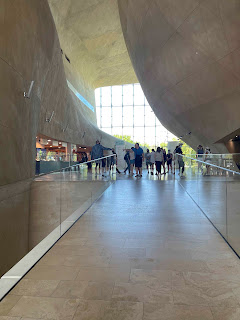Day 6: Warsaw Polin Museum and Uprising Museum
Warsaw is HOT! Hi 80's and low 90's with sweltering sun. When we left the hotel at 9 it was already 84*. We walked through a beautiful park across from the hotel.
Our destination was the Polin Museum, a museum dedicated to the history of the Jews in Poland, The building is supposed to represent the parting of the red sea. I
n front of the museum is a huge monument to honor the heroes of the Jewish Ghetto Uprising.
As early as the 10th century, Jewish merchants were already traveling along trade routes that passed through Poland.When the census of 1764 and 1765 was taken, there were almost 1200 towns where Jews were living . There were about 750,000 Jews living in the Commonwealth at that time, compared with 30,000, at most, around 1500. This period was a heyday for the Jews in Poland where they had significantly more rights and better protection than in Western Europe.

The museum was vey interesting and superbly curated.
We then walked across Warsaw (a total of about 6 miles today) to the Uprising Museum. The first thing we learned was that there were 2 Warsaw uprising, the short-lived3-day Warsaw ghetto uprising thet was mercilessly crushed, abd the much more protracted uprising a year later (1944), by remnants of the Jewish Warsaw Ghetto, and left and right wing militias and Polish army units called to action by the Polish government in exile. The Nazi forces could not comprehend how the Poles were able to hold the Germans at bay for 63 days inflicting considerable damage. Hitler was furious and called for complete annihilation of the city of Warsaw. There was a movie shown that was taken by allied bombers showing the complete destruction of Warsaw.

The other thing we learned was that this museum was no where near as easy to follow as the Polin Museum. We finally got frustrated and very tired and lrft before finishing all the floors.
After returning from the museum, we walked into the Old Town and found a pierrogie restaurant to partake in the local delicacy.





























































